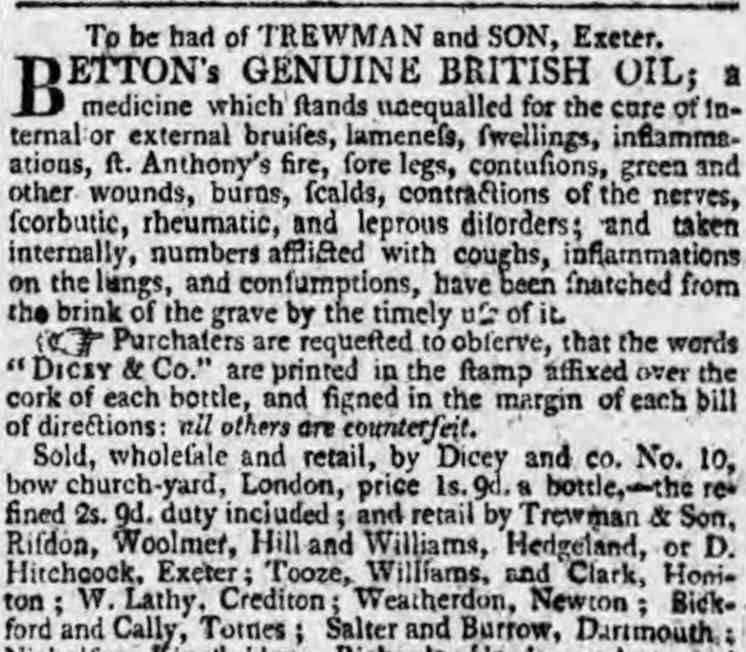William Lathy
The Lathys were a large family of druggists who settled in various parts of Devon.
In the nineteenth century, there was a degree of overlap between apothecaries, druggists, grocers and spicers. In general apothecaries were better trained and were able to treat patients whereas the druggist's role was more concerned with the dispensing of doctors' prescriptions.
William Lathy, son of Richard Lathy, also a druggist, was born in Exeter in 1755. In 1780 he married Sarah Welsford of Crediton.
He was a druggist in Crediton until his death there in 1815, when his widow Sarah continued the business in partnership with her nephew, William Searle. At that time she advertised that their "spirit and wine business would be continued as usual". She died in 1836, aged 79. They had no children.

Betton's Genuine British Oil - typical cure-all sold by William Lathy in Crediton
Three of William's brothers were druggists:
Nicholas was also at various times a silversmith and grocer in Barnstaple. (In 1789, by paying 46 shillings and 8 pence he became a Freeman of the City of London as a member of the Company of Pattenmakers (a patten is an extra wooden sole worn beneath shoes to protect them in muddy streets). The idea behind this was that he believed that as a Freeman he would be exempt from the harbour taxes in Barnstaple.) They had six children in Barnstaple but then seem to have moved to London where he had a "Patent Medicine Warehouse" in Newgate Street. His daughter Mary married Joseph Drew May in 1809. They had two children before Joseph was convicted at the Old Bailey of fraudulently altering bills (i.e. cheques) by adding the digit "1" in front of the amount and increasing its value by £1,000. He does appear to have benefited financially but at his trial it was suggested that his clerk, his brother-in-law William Lathy - who could not be found - had made the alterations. Joseph Drew May was one of seven men hanged at Newgate Gaol on 2 April 1814. What became of this branch of the family thereafter is unclear.
Another druggist brother James worked in Exeter and Totnes.
Richard Hayman Lathy was a druggist in Exeter. One of his sons, Thomas Pike Lathy trained as an attorney but was also an author and playwright in England and Boston USA. He is most famous as a plagiarist, claiming authorship in 1819 of "The Angler: Poem, In Ten Cantos: With Proper Instructions In The Art, Rules To Choose Fishing Rods, Lines, Hooks, Floats, Baits, And To Make Artificial Flies". Another of Richard's sons, William Kent Hayman Lathy served his apprenticeship with a surgeon in Tiverton before emigrating to Pennsylvania where he was one of the pioneer doctors.
